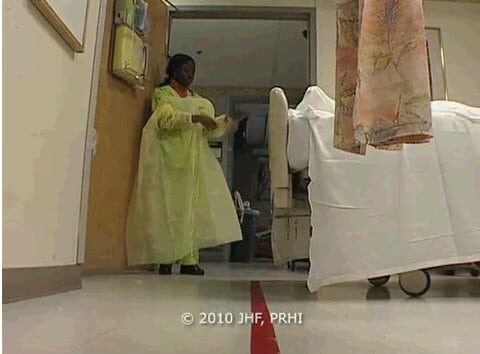 Hat tip to my friend Jack for pointing out these short videos from the Pittsburgh Regional Health Initiative (PRHI) that they call “Teachable Moments.”
Hat tip to my friend Jack for pointing out these short videos from the Pittsburgh Regional Health Initiative (PRHI) that they call “Teachable Moments.”
The first video I saw was just about 3 minutes long, perfect for YouTube and Twitter-era attention spans, and it talked about practical steps staff can take to improve processes and systems to reduce MRSA infections in patients (a form of Hospital Acquired Infection).
The video sets the stage for how bad this problem has been. The good news is that the VA Pittsburgh reduced the MRSA infection rates by 67%. Robert Muder, MD, the Chief of Infectious Disease (you'd think he'd want the term “Prevention” or “Treatment” in his title, but I digress) is featured in the video and says:
“We did not have a good system for ensuring that the staff complied with the precautions.”
I like the emphasis on system… there's often not a good system that makes it easy for people to follow the right protocols. The video shows how basic measures (including 5S principles) were taken to ensure the right gowns and supplies were available where needed when entering the room. This is pretty basic stuff, eh?
I don't like the word “complied” though. That sounds like we're forcing people to do the right thing. I'd rather spend a little time asking “why?” about the lack of adherence to the protocols about gloving and gowning. Is it a lack of education (not likely) or a lack of time (or perceived lack of time)? I'd rather get to the root causes… and making sure people have the right supplies is part of the puzzle.
One of the first solutions shown in the video was a bunch of creative signs and posters that were made by the staff, including this one:
I'm sorry, but if lots of signs were the solution to hand hygiene compliance issues, the problem would have been solved long ago! I've seen signs hanging in hospitals with a copyright date of 1979. I don't think more posters or more creative posters is really going to do much. I'd be curious to see data about how much “posters alone” could impact hand hygiene and infection rate data??
But, thankfully the video got to more systemic countermeasures, including the staging of supplies, as shown on the door in the picture below.
There was an element, I guess, of visual control put in place — a red line on the floor. If you cross the red line (and get closer to the patient), you have to glove and gown up.
I'd be a bit skeptical if that red line really made a difference. If people don't have the time (because of too much waste in their work) and they don't have the right supplies (is that door being restocked under a good standardized process), is the red line going to matter? That seems more like window dressing than systemic change.
By comparison, do you remember Kevin Frieswick's error-proofing gate at the room at MetroWest Medical Center in Framingham, Massachusetts? Now THAT will make you stop and think, don't you think?
My nitpicking and questions aside, I really DO admire and appreciate that the hospital and PRHI are sharing their story in a video format. I wish more organizations would share that way. It's a personal goal of mine in our Healthcare Value Leaders Network efforts to make better use of video, especially short videos made by people doing the real work in healthcare.
What do you think?
You can find the full list of videos here.
What do you think? Please scroll down (or click) to post a comment. Or please share the post with your thoughts on LinkedIn – and follow me or connect with me there.
Did you like this post? Make sure you don't miss a post or podcast — Subscribe to get notified about posts via email daily or weekly.
Check out my latest book, The Mistakes That Make Us: Cultivating a Culture of Learning and Innovation:











